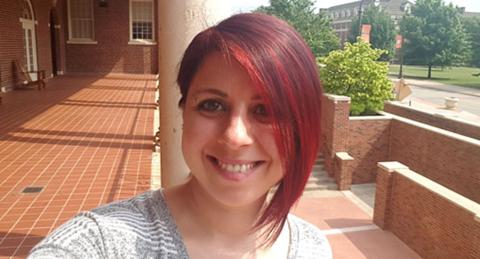
What are you currently doing for work and how did you get to this point?
Currently I am the social media and engagement coordinator at the American Association of Geographers (AAG). The AAG is a non-profit membership association for academic and professional geographers located in Washington, DC. I am responsible for connecting with our membership community both through the AAG's social media accounts as well as through in-person events. I also work on research and project about the geographic discipline.
My previous experiences as a geography professor and graduate student studying social media and communications paved the way for my job today.
Prior to my current job, I was a clinical assistant professor of Geography at Oklahoma State University where I taught geography courses in human geography, economic geography and geographies of media. I was also the geography undergraduate program coordinator. I started at Oklahoma State in 2015 after obtaining a Ph.D. in geography from the University of Kansas. While at KU, my dissertation research focused on economic geography and social media -- I studied how social media platforms, like Foursquare and Yelp, have an effect on where people go to consume goods and services and how this has an effect on cities. My dissertation research in the area of social media also led me to focus research efforts on cyberterrorism and the Arab Spring, which largely occurred while I was in graduate school. Before my Ph.D. work, I received an M.A. in geography from Kent State University in 2010 (two years after graduating from UNH). My master's work focused on American Sign Language and the Deaf community, paving the way for my later research interests in communications and the media.
How did your education in COLA prepare you for life after college?
My education in COLA prepared me for life after college because it allowed me to put together a variety of interests and skillsets. As a double major in history and geography with a minor in Deaf Studies, I developed a variety of perspectives and skills. I relied on my history education heavily in graduate school. The history classes I took taught me how to write and how to read and think critically. I credit much of my academic success to the writing and analytic skills I learned in history courses. My geography classes instilled a passion for the subject. I continued pursuing geography in my masters and doctoral work and continue to work for the geographic discipline at the American Association of Geographers. I believe that geography education is fundamental for U.S. citizens living in a globally connected world. My courses in American Sign Language not only paved the way for my masters' research, but provided me with the skill of speaking another language. I've actively used everything from my education in COLA in my later life.
What person or course most influenced you while at UNH?
An unfair question... I think that UNH as a whole prepared me as I was able to explore all of my interests in one place. I know that my teaching style as a geography professor was largely influenced by two professors: Alasdair Drysdale in the Geography Department and Gregory McMahon in the History Department. As a double major of history and geography, I took many classes from both of these professors. Professor Drysdale was a wealth of geographic knowledge who kept my mind open to everything the world had to offer. His classes helped me realize my interest in piecing together large scale events through space and time, something I took with me to graduate school. Professor McMahon always encouraged learning through questions. He led you to realizations by asking questions and making you think critically for yourself. Critical thinking is the hardest and most crucial skill to teach and I learned much from him about how to encourage that.
What advice do you have for students interested in your field?
Geography may seem small on campus, but it's growing so much! There's such a large demand right now for people with geographic skillsets. Being able to synthesize, critically think, and engage with on-the-ground observations is necessary in today's work environment. Being globally aware makes for better citizens and a better world.